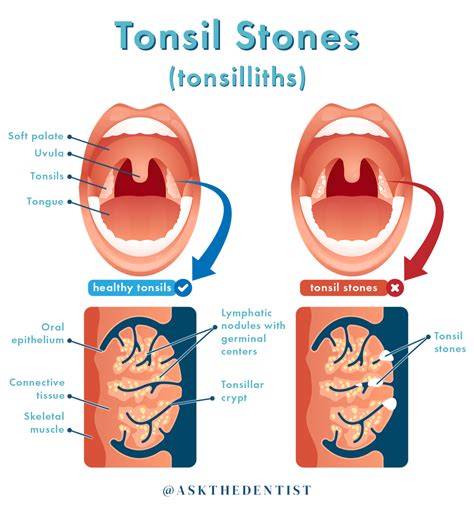How to Know If You Have Tonsil Stones
Tonsil stones, also known as tonsilloliths, are hard, pebble-like formations that can develop in the crevices of your tonsils. While often harmless, they can cause a range of unpleasant symptoms, making it crucial to understand how to identify them. This guide will walk you through the key signs and symptoms, helping you determine if you might have tonsil stones and when to seek professional medical advice.
Recognizing the Signs of Tonsil Stones
The most obvious sign of tonsil stones is the visual identification of small, yellowish or whitish stones or deposits lodged in the tonsils. You might spot them yourself using a mirror or a flashlight. However, some tonsil stones are hidden deeper within the tonsils and might be harder to see.
Common Symptoms to Watch For:
-
Persistent Bad Breath (Halitosis): This is arguably the most common symptom. The trapped bacteria within the stones produce a foul odor that ordinary brushing and mouthwash can't eliminate. Strong, persistent bad breath that doesn't improve with oral hygiene is a major red flag.
-
Sore Throat: A persistent sore throat, especially feeling something is stuck or lodged in the back of your throat, is another significant indicator. This discomfort can be intermittent or constant, depending on the size and number of stones.
-
Ear Pain: Believe it or not, tonsil stones can sometimes cause referred pain in the ear. This is due to the close proximity of the tonsils and ears, and the nerves involved.
-
White or Yellow Spots: As mentioned, visible white or yellow spots on your tonsils are a direct indication of potential tonsil stones. These spots might have a bumpy or irregular texture.
-
Difficulty Swallowing (Dysphagia): Large tonsil stones can sometimes interfere with swallowing, causing discomfort or a feeling of blockage.
-
Coughing: In some cases, tonsil stones can trigger a persistent cough, as your body tries to dislodge the irritating objects.
-
Throat Irritation: A general feeling of throat irritation, dryness, or scratchiness can also be a symptom.
When to See a Doctor
While many people can successfully manage minor tonsil stone issues at home, it's important to consult a doctor if you experience:
- Severe or persistent pain.
- Difficulty breathing or swallowing.
- Recurring tonsil stones despite home remedies.
- Fever or other signs of infection.
Distinguishing Tonsil Stones from Other Conditions
It's crucial to remember that the symptoms associated with tonsil stones can also indicate other throat and mouth conditions. Do not self-diagnose. If you're experiencing persistent throat problems, it's vital to consult a healthcare professional for accurate diagnosis and treatment. They can differentiate tonsil stones from conditions like strep throat, tonsillitis, or other infections.
Home Remedies (Consult your doctor before trying these):
Several home remedies, like gargling with salt water or using a water pick, can help dislodge smaller tonsil stones. However, these are not always effective, and it's essential to consult your doctor before attempting any self-treatment.
By understanding the signs and symptoms outlined above, you can better assess whether you might have tonsil stones and take the appropriate steps to manage or treat the condition effectively. Remember, a doctor's visit is always recommended for accurate diagnosis and treatment, especially if symptoms are severe or persistent.
